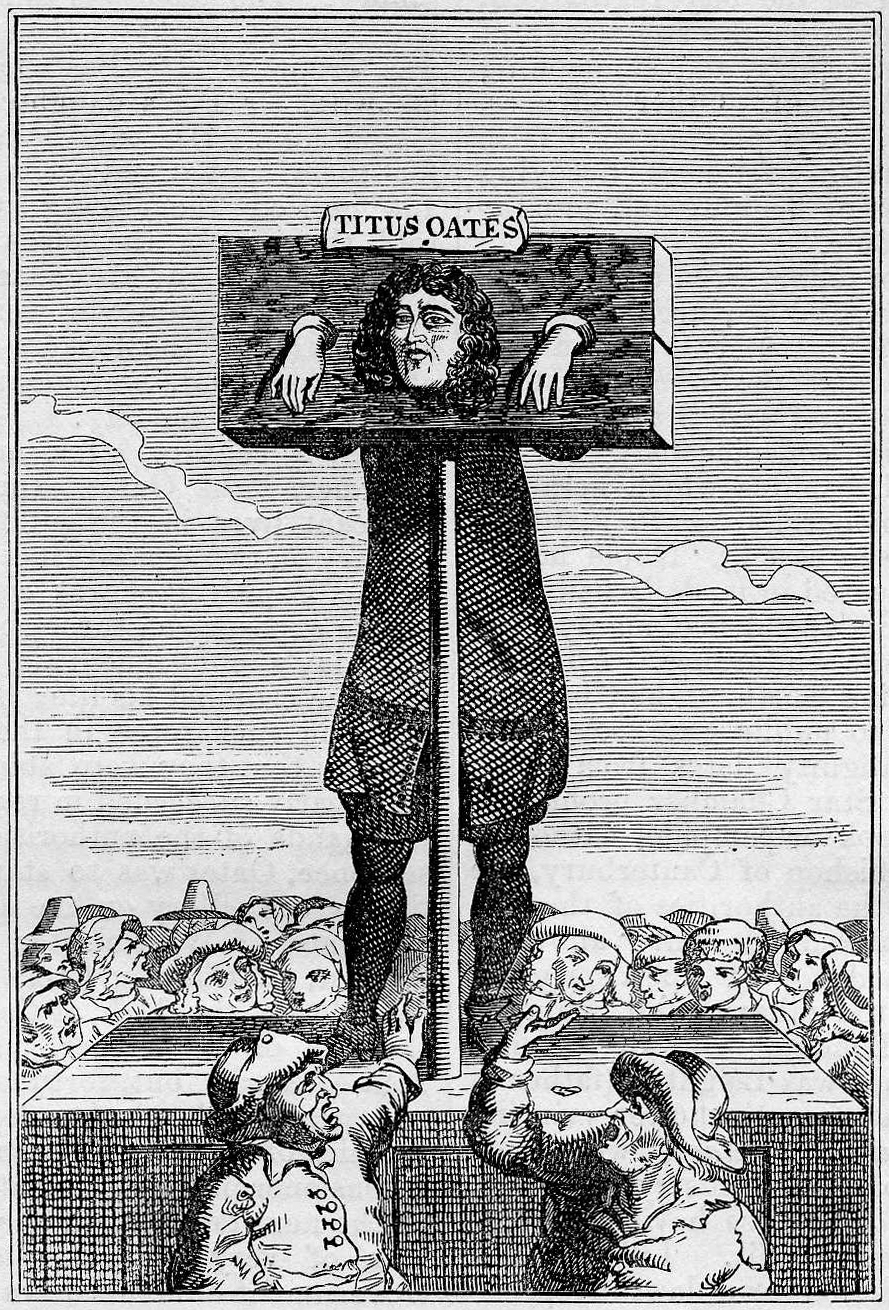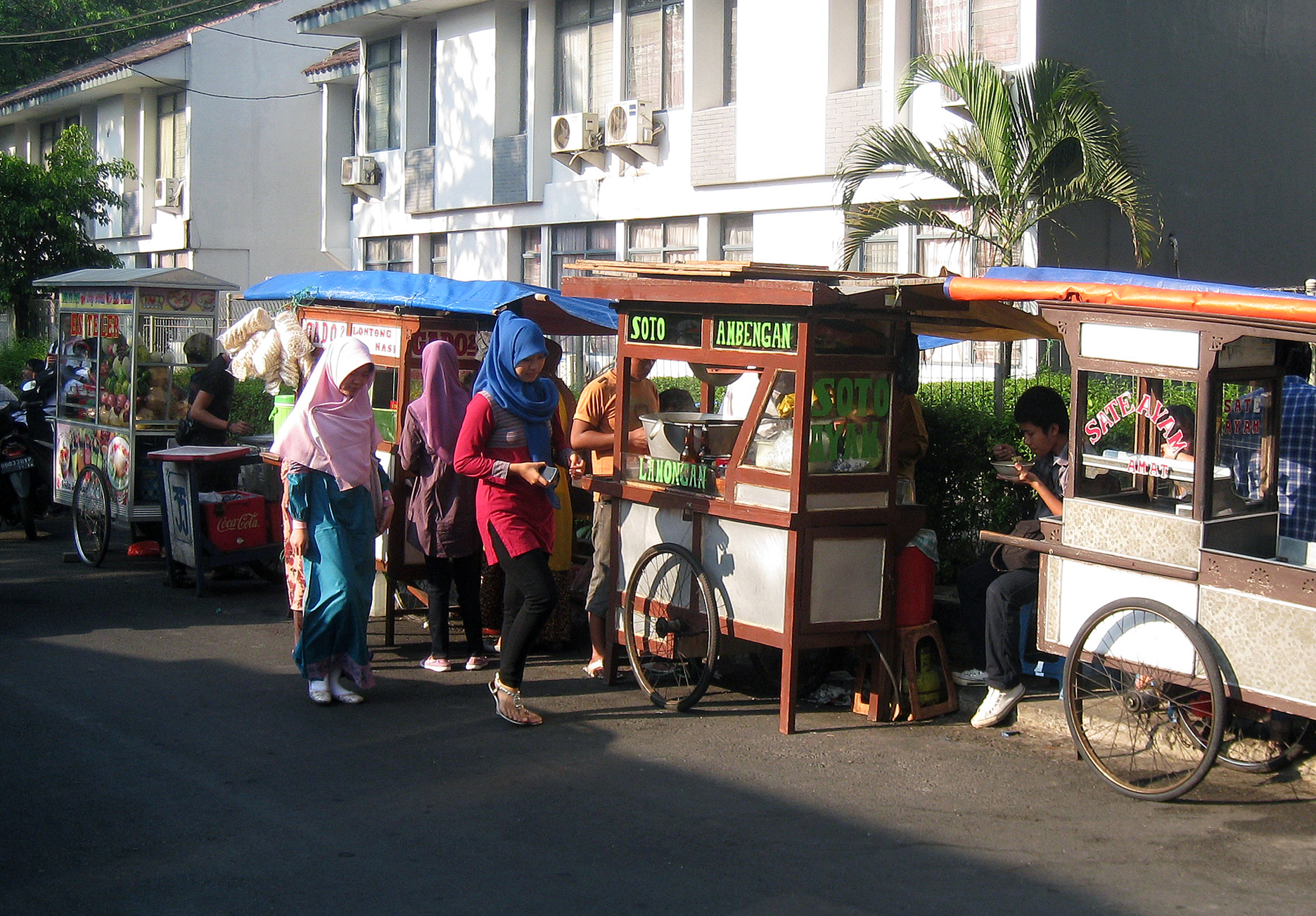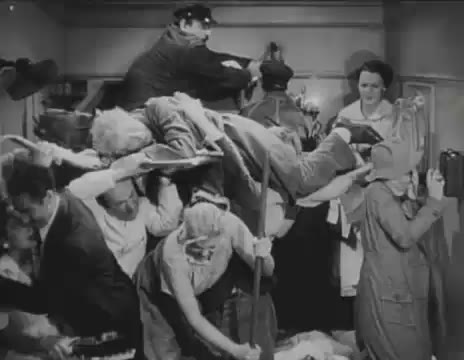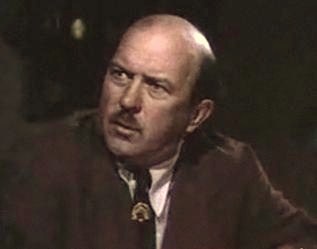|
Duck Soup (1933 Film)
''Duck Soup'' is a 1933 American pre-Code musical comedy film written by Bert Kalmar and Harry Ruby (with additional dialogue by Arthur Sheekman and Nat Perrin) and directed by Leo McCarey. Released by Paramount Pictures on November 17, 1933, it stars the four Marx Brothers ( Groucho, Harpo, Chico, and Zeppo in his final film appearance) and also features Margaret Dumont, Louis Calhern, Raquel Torres and Edgar Kennedy. ''Duck Soup'' was the last of the five Marx Brothers films released by Paramount Pictures. In the film, Groucho portrays Rufus T. Firefly, the newly installed president of the fictional country of Freedonia. Zeppo is his secretary, while Chico and Harpo are spies for the neighboring country of Sylvania. Relations between Firefly and the Sylvanian ambassador (Calhern) deteriorate during the film, eventually leading the two countries to war. Compared to the Marx Brothers' previous films, ''Duck Soup'' was a financial disappointment, though not an outright ... [...More Info...] [...Related Items...] OR: [Wikipedia] [Google] [Baidu] |
Leo McCarey
Thomas Leo McCarey (October 3, 1898 – July 5, 1969) was an American film director, screenwriter, and producer. He was involved in nearly 200 films, including the critically acclaimed '' Duck Soup'', '' Make Way for Tomorrow'', '' The Awful Truth'', '' Going My Way'', '' The Bells of St. Mary's'', '' My Son John'', and '' An Affair to Remember''. While focusing mainly on screwball comedies during the 1930s, McCarey turned towards producing more socially conscious and overtly religious films during the 1940s, ultimately finding success and acclaim in both genres. McCarey was one of the most popular and established comedy directors of the pre-World War II era. Life and career Born in Los Angeles, California, McCarey attended St. Joseph's Catholic School and Los Angeles High School. His father was Thomas J. McCarey, whom the Los Angeles Times called "the greatest fight promoter in the world." Leo McCarey would later make a boxing comedy with Harold Lloyd called '' The Milk ... [...More Info...] [...Related Items...] OR: [Wikipedia] [Google] [Baidu] |
Pre-Code Hollywood
Pre-Code Hollywood was an era in the Cinema of the United States, American film industry that occurred between the widespread adoption of sound in film in the late 1920s and the enforcement of the Motion Picture Production Code censorship guidelines (popularly known as the Hays Code) in 1934. Although the Hays Code was adopted in 1930, oversight was poor, and it did not become rigorously enforced until July 1, 1934, with the establishment of the Production Code Administration. Before that date, film content was restricted more by local laws, negotiations between the Studio Relations Committee (SRC) and the major studios, and popular opinion than by strict adherence to the Hays Code, which was often ignored by Hollywood filmmakers. As a result, some films in the late 1920s and early 1930s depicted or implied Innuendo, sexual innuendo, romantic and sexual relationships between white and black people, mild profanity, Recreational drug use, illegal drug use, promiscuity, prostitut ... [...More Info...] [...Related Items...] OR: [Wikipedia] [Google] [Baidu] |
Pillory
The pillory is a device made of a wooden or metal framework erected on a post, with holes for securing the head and hands, used during the medieval and renaissance periods for punishment by public humiliation and often further physical abuse. The pillory is related to the stocks. Etymology The word is documented in English since 1274 (attested in Anglo-Latin from ), and stems from Old French (1168; French language, modern French , see below), itself from medieval Latin , of uncertain origin, perhaps a diminutive of Latin 'pillar, stone barrier'. Description Rather like the lesser punishment called the stocks, the pillory consisted of hinged wooden boards forming holes through which the head or various limbs were inserted; then the boards were locked together to secure the captive. Pillories were set up to hold people in marketplaces, crossroads, and other public places. They were often placed on platforms to increase public visibility of the person; often a placard deta ... [...More Info...] [...Related Items...] OR: [Wikipedia] [Google] [Baidu] |
Food Cart
A food cart is a mobile kitchen set up on the street to prepare and sell street food to passers-by. Food carts are often found in cities worldwide selling food of every kind. Food carts come in two basic styles. One allows the vendor to sit or stand inside and serve food through a window. In the other, the vendor stands next to the cart, while all the room in the cart is used for storage and to house the cooking machinery, usually a grilling surface. The cart style is determined principally by the type of food. Food carts are different from food trucks because they do not travel under their own power. Some food carts are towed by another vehicle, while some are pushed by a human or animal. History The first food carts probably came into being at the time of the early Greek and Roman civilizations with traders converting old hand-carts and smaller animal-drawn carts into mobile trading units. Carts have the distinct advantage of mobility, should a location not be producti ... [...More Info...] [...Related Items...] OR: [Wikipedia] [Google] [Baidu] |
Freedonia
Freedonia, Fredonia or Fredon is the name given to several fictional countries. The name was used for some aspects of the United States in the 19th century, and later popularized by the 1933 Marx Brothers film '' Duck Soup'' where it was the name of the fictional country in which the film was set. Over time, the word has come to have a more generic meaning, anything from a noun describing a plausible yet fictional country, to an adjective ("Freedonian") used to characterize a place ''like'' the Freedonia of ''Duck Soup''. Because the Marx Brothers' film had so many qualities—autocracy, diminutiveness, and obscurity, to name but a few—a place can be described as "Freedonian" for having any one of these qualities. Usage 19th century As a name for the United States Samuel Mitchill suggested that 'Fredonian' be used by citizens of the United States ("Fredon") after the American Revolution in place of the demonym "American", which was then being used as a pejorative ter ... [...More Info...] [...Related Items...] OR: [Wikipedia] [Google] [Baidu] |
National Film Registry
The National Film Registry (NFR) is the United States National Film Preservation Board's (NFPB) collection of films selected for preservation (library and archival science), preservation, each selected for its cultural, historical, and aesthetic contributions since the NFPB's inception in 1988. History Throughout the 1980s, several prominent filmmakers and industry personalities in the United States, such as Frank Capra and Martin Scorsese, advocated for Congress to enact a film preservation bill in order to avoid commercial modifications (such as pan and scan and editing for TV) of classic films, which they saw as negative. In response to the controversy over the Film colorization#Entertainment make-overs, colorization of originally black and white films in the decade specifically, Representatives Robert J. Mrazek and Sidney R. Yates introduced the National Film Preservation Act of 1988, which established the National Film Registry, its purpose, and the criteria for selecti ... [...More Info...] [...Related Items...] OR: [Wikipedia] [Google] [Baidu] |
Library Of Congress
The Library of Congress (LOC) is a research library in Washington, D.C., serving as the library and research service for the United States Congress and the ''de facto'' national library of the United States. It also administers Copyright law of the United States, copyright law through the United States Copyright Office, and it houses the Congressional Research Service. Founded in 1800, the Library of Congress is the oldest Cultural policy of the United States, federal cultural institution in the United States. It is housed in three buildings on Capitol Hill, adjacent to the United States Capitol, along with the National Audio-Visual Conservation Center in Culpeper, Virginia, and additional storage facilities at Fort Meade, Fort George G. Meade and Cabin Branch in Hyattsville, Maryland. The library's functions are overseen by the librarian of Congress, and its buildings are maintained by the architect of the Capitol. The LOC is one of the List of largest libraries, largest libra ... [...More Info...] [...Related Items...] OR: [Wikipedia] [Google] [Baidu] |
Masterpiece
A masterpiece, , or ; ; ) is a creation that has been given much critical praise, especially one that is considered the greatest work of a person's career or a work of outstanding creativity, skill, profundity, or workmanship. Historically, a "masterpiece" was a work of a very high standard produced by an apprentice to obtain full membership, as a "master", of a guild or academy in various areas of the visual arts and crafts. Etymology The form ''masterstik'' is recorded in English or Scots in a set of Aberdeen guild regulations dated to 1579, whereas ''masterpiece'' is first found in 1605, already outside a guild context, in a Ben Jonson play. ''Masterprize'' was another early variant in English. In English, the term rapidly became used in a variety of contexts for an exceptionally good piece of creative work, and was "in early use, often applied to man as the 'masterpiece' of God or Nature". History Originally, the term ''masterpiece'' referred to a piece of work ... [...More Info...] [...Related Items...] OR: [Wikipedia] [Google] [Baidu] |
Irving Thalberg
Irving Grant Thalberg (May 30, 1899 – September 14, 1936) was an American film producer during the early years of motion pictures. He was called "The Boy Wonder" for his youth and ability to select scripts, choose actors, gather production staff, and make profitable films, including ''Grand Hotel (1932 film), Grand Hotel'', ''China Seas (film), China Seas'', ''A Night at the Opera (film), A Night at the Opera'', ''Mutiny on the Bounty (1935 film), Mutiny on the Bounty'', ''Camille (1936 film), Camille'' and ''The Good Earth (film), The Good Earth''. His films carved out an international market, "projecting a seductive image of American life brimming with vitality and rooted in democracy and personal freedom", states biographer Roland Flamini. He was born in Brooklyn, New York, and as a child was afflicted by a congenital heart disease that doctors said would kill him before he reached the age of thirty. After graduating from high school he worked as a store clerk during th ... [...More Info...] [...Related Items...] OR: [Wikipedia] [Google] [Baidu] |
A Night At The Opera (film)
''A Night at the Opera'' is a 1935 American comedy film starring the Marx Brothers ( Groucho, Harpo and Chico), and featuring Kitty Carlisle, Allan Jones, Margaret Dumont, Sig Ruman, and Walter Woolf King. It was the first of five films the Marx Brothers made under contract for Metro-Goldwyn-Mayer after their departure from Paramount Pictures, and the first after Zeppo left the act. The film was written by George S. Kaufman and Morrie Ryskind from a story by James Kevin McGuinness, with additional uncredited dialogue by Al Boasberg. The film was directed by Sam Wood. One of MGM's biggest hits at the 1935 box office, ''A Night at the Opera'' was selected in 1993 for preservation in the National Film Registry by the Library of Congress as being "culturally, historically, or aesthetically significant". [...More Info...] [...Related Items...] OR: [Wikipedia] [Google] [Baidu] |
Metro-Goldwyn-Mayer
Metro-Goldwyn-Mayer Studios Inc. (also known as Metro-Goldwyn-Mayer Pictures, commonly shortened to MGM or MGM Studios) is an American Film production, film and television production and film distribution, distribution company headquartered in Beverly Hills, California. Metro-Goldwyn-Mayer was founded on April 17, 1924, and has been owned by the Amazon MGM Studios subsidiary of Amazon (company), Amazon since 2022. MGM was formed by Marcus Loew by combining Metro Pictures, Goldwyn Pictures and Louis B. Mayer Pictures into one company. It hired a number of well-known actors as contract players—its slogan was "more stars than there are in heaven"—and soon became Hollywood's most prestigious filmmaking company, producing popular musical films and winning many Academy Awards. MGM also owned film studios, movie lots, movie theaters and technical production facilities. Its most prosperous era, from 1926 to 1959, was bracketed by two productions of ''Ben-Hur: A Tale of the Christ ... [...More Info...] [...Related Items...] OR: [Wikipedia] [Google] [Baidu] |
Edgar Kennedy
Edgar Livingston Kennedy (April 26, 1890 – November 9, 1948) was an American comedic character actor who appeared in at least 500 films during the silent and sound eras. Professionally, he was known as "Slow Burn", owing to his ability to portray characters whose anger slowly rose in frustrating situations. In many of his roles, he used exasperated facial expressions and performed very deliberately to convey his rising anger or "burn", often rubbing his hand over his bald head and across his face in an effort to control his temper. One memorable example of his comedy technique can be seen in the 1933 Marx Brothers' film '' Duck Soup'', where he plays a sidewalk lemonade vendor who is harassed and increasingly provoked by Harpo and Chico. Early years Kennedy was born April 26, 1890, in Monterey County, California, to Canadians Neil Kennedy and Annie Quinn. He attended San Rafael High School before taking up boxing. After boxing, he worked as a singer in vaudeville, musical ... [...More Info...] [...Related Items...] OR: [Wikipedia] [Google] [Baidu] |









